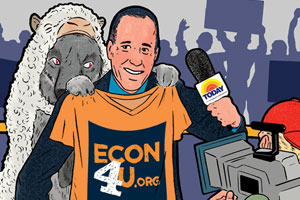Americans who endured Sunday night’s Academy Awards ceremony were treated to a surprisingly aggressive campaign-style ad attacking the Humane Society for supposedly spending less than one cent of every dollar it takes in on animal shelters. The ad opens with a blaring siren on one side of the screen and footage from a Humane Society TV spot on the other. “Consumer alert!” a voiceover declares. “If you’ve seen this ad or donated to the Humane Society of the United States, you should know that only one penny of every dollar donated goes to local pet shelters.”
Take a look:
The group behind the ad is the Center for Consumer Freedom, a creation of the Washington PR guru Rick Berman, who runs an array of corporate-funded front groups targeting public-interest outfits, unions, and other organizations that pose a threat to the bottom line of Berman’s clients. (As Mother Jones has reported in the past, Berman’s firms have also shilled for predatory loan companies.) The Center for Consumer Freedom largely focuses on opposing laws and regulations that are bad for the food and beverage industries. The group is known for fact-bending ad campaigns downplaying, among other things, the amount of mercury in fish and the number of drunk-driving deaths. In 2007, Berman told CBS’s 60 Minutes that he essentially sees himself as a warrior against an encroaching nanny state that seeks to deprive Americans of all the delicious foods they love to eat.
According to the Center for Consumer Freedom’s 2010 tax filing, the group set aside about a million dollars to set up its anti-Humane Society website “Humane Watch.” Berman has created a separate group with the oddly Humane Society-sounding name, the Humane Society for Shelter Pets. Its website snarks at the Humane Society for failing to provide more money for animal shelters.
Berman’s group openly acknowledges that it is supported by restaurants and other food companies. But as a 501(c)(3), it doesn’t have to disclose its donors, allowing the Center for Consumer Freedom’s corporate funders to avoid being tarnished by attacks like the one CCF aired during the Oscars.
“You can take money from any source; you don’t have to worry about contribution limits or anything like that. The donors are kept secret, so there’s no disclosure of who’s ultimately paying for the ad,” says Bill Allison, the editorial director of the Sunlight Foundation. “You can have a political impact without necessarily disclosing who you are and what you’re doing.”
So why would a group funded by the food industry group go after the Humane Society? Both the Humane Society and the Center for Consumer Freedom seem to agree this is not about lost puppies. Rather, it’s about the Humane Society’s success in altering laws and regulations dealing with animal cruelty, which can sometimes increase the cost of doing business.
“They seek to use ballot initiatives and lobbyists to change laws in ways that are not in line with consumer demand,” says Justin Wilson, senior research analyst at the Center for Consumer Freedom. “If you want to buy cage-free hand-foraged eggs from the farmer who grows them on the roof of a building in Williamsburg, Brooklyn, that’s great. Alternatively, if your view of these things is different from people who want to spend that much money, that should be their choice.”
Wilson argues that the Humane Society’s ads give donors a false impression of where their money goes, and that his group is simply informing the public of what the Humane Society actually does. So does the Humane Society really gives just 1 percent of its budget to animal shelters? Yes, says Humane Society President and CEO Wayne Pacelle—but that’s a statistic he calls a “false frame,” both because the group spends tens of millions on sterilization, sanctuaries, and animal rescues all over the country, and because the group has never claimed to simply fund animal shelters. According to its 2010 annual report, the Humane Society spent $27 million on “direct care and service” for animals and about $53 million on “advocacy and public policy.” Pacelle says all the footage in their ads comes directly from Humane Society staffers.
“The only reason he’s attacking us is that we’re the most effective animal protection group in the world, not because we’re bad at what we do,” Pacelle says. He pointed out that just a few weeks ago the Humane Society persuaded McDonald’s to stop confining pregnant pigs in cramped gestational crates. “They’d love it if we put all our money exclusively into rescuing animals on the street and didn’t get to the source of the problem.”
















